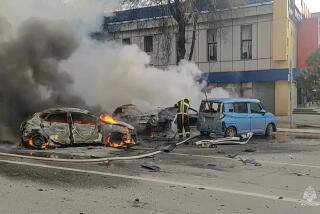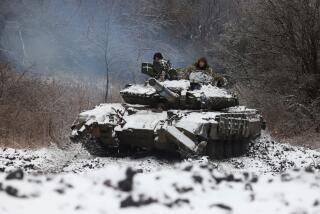War Crime in the Making
- Share via
Russia has sent a chilling ultimatum to the estimated 40,000 people who remain huddled in the cellars and bomb shelters of Grozny, the capital of embattled Chechnya. They have been warned to leave the city by Saturday, using a designated escape route, or die. In four days Moscow intends to launch all-out air and artillery attacks that it hopes will wipe out the thousands of armed Islamic rebels still believed to be in the capital. Grozny already is largely depopulated. Noncombatants still there are mainly the elderly, the sick and the wounded who are incapable of moving to safety. The intensified attacks promised by Moscow could entomb in rubble those who remain. This is a war crime in the making.
The United States, the European Union and others have called on Russia to seek a political settlement in Chechnya. Moscow has scorned that advice. Chechnya, it says, is an internal matter, and it is fighting to suppress bandits and terrorists.
In fact the Russian military is eager to avenge the humiliation it suffered when it failed to subdue Chechnya in a 1994-96 war, and it has public and political opinion largely on its side. Long-standing ethnic hostility toward Chechens was inflamed earlier this year by a number of explosions in Russia proper that killed hundreds and that the government claims--so far without offering any evidence--were the work of Chechen criminals.
Prime Minister Vladimir V. Putin, a likely candidate for president next year, has given his full support to the Chechen operation and rewarded the military with a bigger budget. And with parliamentary elections less than two weeks away, few who aspire to office are prepared to question the tactics or morality of the war.
The International Monetary Fund’s decision to hold up a $640-million loan installment to Russia was clearly linked to Chechnya, but it has had no effect. That doesn’t mean Moscow is beyond the reach of effective protest. The West must not talk itself into moral paralysis over its concerns about Russia’s continuing importance as a world player. Grozny is becoming as much a symbol of brutally indiscriminate warfare as the Basque town of Guernica became when it was devastated by Nazi bombers during the Spanish Civil War. President Clinton has warned that Russia will “pay a heavy price” for its actions. Those are bold words. Let him now lead by showing that they have real meaning.
More to Read
Sign up for Essential California
The most important California stories and recommendations in your inbox every morning.
You may occasionally receive promotional content from the Los Angeles Times.










